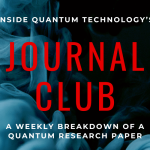Quantum News briefs: March 8, 2024: Classiq and Alice & Bob Partner to Deliver End-to-End Quantum Computing From High-Level Development to Logical Qubit Emulator; QuantrolOx and Zurich Instruments Team Up to Accelerate Quantum Advantage; Zapata AI and Andretti INDYCAR Gear Up to Apply Industrial Generative AI to Race Day Strategy and Analytics in 2024; Vescent Announces $5M in Series Seed Funding Led by Corporate Fuel; Max Planck Institute of Quantum Optics (MPQ) Researchers Successfully Develop Novel Technique for Deciphering Properties of Light and Matter; French Defense Ministry Awards 5 Contracts to Alice & Bob, C12, Pasqal, Quandela and Quobly Worth Up to €500 million (US$545 million) To Develop Quantum Computers

Quantum News Briefs: March 8, 2024:
Classiq and Alice & Bob Partner to Deliver End-to-End Quantum Computing From High-Level Development to Logical Qubit Emulator
Classiq, a quantum software leader, and Alice & Bob, at the forefront of developing a fault-tolerant quantum computer, have formed a strategic partnership to merge quantum software and hardware advancements. This collaboration aims to usher in the era of Fault-Tolerant Quantum Computing by integrating Alice & Bob’s innovative cat qubit technology into the Classiq platform, enhancing it with advanced tooling for logical qubits. Théau Peronnin, CEO of Alice & Bob, highlighted the collaboration as a significant paradigm shift, emphasizing the critical role of logical qubits and the revolutionary combination of cat qubits with Classiq’s sophisticated circuit synthesis engine. The partnership also introduces an early-access program for a logical qubit emulator on Classiq’s platform, enabling researchers to simulate logical qubits and test quantum algorithms’ resilience against quantum noise. Nir Minerbi, CEO of Classiq, expressed enthusiasm for the collaboration’s potential to maximize the use of quantum computers and support Alice & Bob’s ambition to build a quantum computer with 100 logical qubits at a notably low error rate, promising future enhancements in resource estimation and compilation tools. This alliance marks a significant step towards realizing the full potential of quantum computing by providing the quantum community with access to cutting-edge technologies.
QuantrolOx and Zurich Instruments Team Up to Accelerate Quantum Advantage

QuantrolOx, based in Espoo, Finland, and Zurich Instruments from Zurich, Switzerland, have announced their collaboration, integrating Zurich Instruments’ Quantum Computing Control System (QCCS) into QuantrolOx’s Quantum EDGE platform as of March 2024. This integration significantly advances quantum computing experimentation by combining RF Signal Generators, Quantum Analyzers, and Qubit Controllers with over 1 GHz instantaneous bandwidth for efficient parallel qubit tune-up. The partnership also introduces the SHF+ product line, enhancing high-fidelity gate operations with superior signal-to-noise ratios and spectral purity. Facilitated by Zurich Instruments’ LabOne Q software, this collaboration has significantly expedited progress in quantum computing automation, offering over a 100x speed increase in system bring-up, characterization, and testing. Both companies highlight the mutual benefits of their cooperation, emphasizing rapid scalability and enhanced multi-qubit gate operations and readouts in their future roadmap.
Zapata AI and Andretti INDYCAR Gear Up to Apply Industrial Generative AI to Race Day Strategy and Analytics in 2024
Zapata Computing, Inc., an Industrial Generative AI software developer, and Andretti INDYCAR, a Championship-winning motorsports organization, have announced their continuation into a third NTT INDYCAR SERIES season together, focusing on engineering and technological innovations to enhance competitive performance. The partnership emphasizes using Zapata AI’s solutions, particularly the Zapata AI Sense on the Orquestra® platform, to develop an advanced technology stack for race strategy and data signal generation. With achievements in virtual sensors, decision-making support, and data infrastructure enhancement from the previous season, the collaboration aims to exploit generative AI further to optimize race variables like fuel consumption and pitstop strategy and enhance predictive capabilities for lap times, tire degradation, and more. The partnership’s ongoing efforts include leveraging real-time analytics, improving virtual sensor simulation, and integrating performance monitoring tools for live data stream capabilities, all in pursuit of tangible results on the race track.
Vescent Announces $5M in Series Seed Funding Led by Corporate Fuel
![]()
Vescent, a pioneering company at the forefront of Quantum 2.0 Technologies aimed at commercialization, has successfully secured a $5 million Series Seed funding round led by Corporate Fuel with participation from Caruso Ventures. This significant financial boost is set to accelerate Vescent’s introduction of new products, enhance its manufacturing capabilities to better meet rising customer demand, and extend its market presence. Leveraging its deep-rooted quantum expertise and proven track record in commercialization and manufacturing, Vescent aims to offer cutting-edge solutions like Frequency Combs, Lasers, and Controls, which are essential for quantum timing, computing, networking, and sensing applications. The investment will facilitate the expansion of manufacturing infrastructure, including increased CAPEX and staffing, to support Vescent’s clientele in swiftly commercializing their quantum technologies. Russ Fein of Corporate Fuel highlighted the company’s crucial role in the global quantum ecosystem. At the same time, Dan Caruso of Caruso Ventures expressed enthusiasm for supporting Vescent’s leadership in quantum hardware manufacturing. CEO Scott Davis underscored the capital’s vital role in advancing Vescent’s mission to scale the quantum ecosystem, emphasizing the company’s readiness to tackle the challenges of quantum technology.
Max Planck Institute of Quantum Optics (MPQ) Researchers Successfully Develop Novel Technique for Deciphering Properties of Light and Matter
![]()
Researchers at the Max Planck Institute of Quantum Optics have introduced a significant technique in ultraviolet spectroscopy that allows for the precise detection and quantification of various substances with high chemical selectivity under low-light conditions. This novel method, detailed in the journal Nature, utilizes high-resolution linear-absorption dual-comb spectroscopy in the ultraviolet range, enabling previously challenging experiments due to light sensitivity. The team has overcome traditional limitations by employing dual-comb spectroscopy, which measures interference between two frequency combs with slightly different repetition rates, allowing for precision spectroscopy of single atoms and molecules and applications in fundamental physics tests, atmospheric chemistry, and astrophysics. This advancement paves the way for new scientific and technological applications in photon-level diagnostics. It extends the potential for dual-comb spectroscopy to operate in scenarios with essential low light levels. It offers promising future applications in fields such as biomedical sensing and environmental atmospheric sounding.
French Defense Ministry Awards 5 Contracts to Alice & Bob, C12, Pasqal, Quandela and Quobly Worth Up to €500 million (US$545 million) To Develop Quantum Computers

France’s defense-procurement agency has awarded contracts worth up to €500 million to five French computer research startups—Alice & Bob, C12, Pasqal, Quandela, and Quobly—to develop technology for two universal quantum computer prototypes by 2032, aimed at meeting defense requirements. This initiative is part of President Emmanuel Macron’s national quantum strategy, launched three years ago to ensure France’s sovereignty in quantum computing, a field promising to solve complex problems faster than classical computers through quantum physics. The project underscores the significant potential of quantum technology in areas like cryptography and communications, aiming for groundbreaking applications in various fields. Coordinated by the Defense Digital Agency (AND), this program represents a competitive three-stage process focusing on concept proof, maturation, and industrialization, aiming to develop scalable logic qubits for commercial use, reflecting France’s ambition to advance in the quantum computing race amidst global competition.
Kenna Hughes-Castleberry is the Managing Editor at Inside Quantum Technology and the Science Communicator at JILA (a partnership between the University of Colorado Boulder and NIST). Her writing beats include deep tech, quantum computing, and AI. Her work has been featured in National Geographic, Scientific American, Discover Magazine, New Scientist, Ars Technica, and more.




















